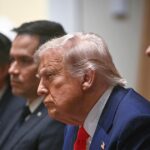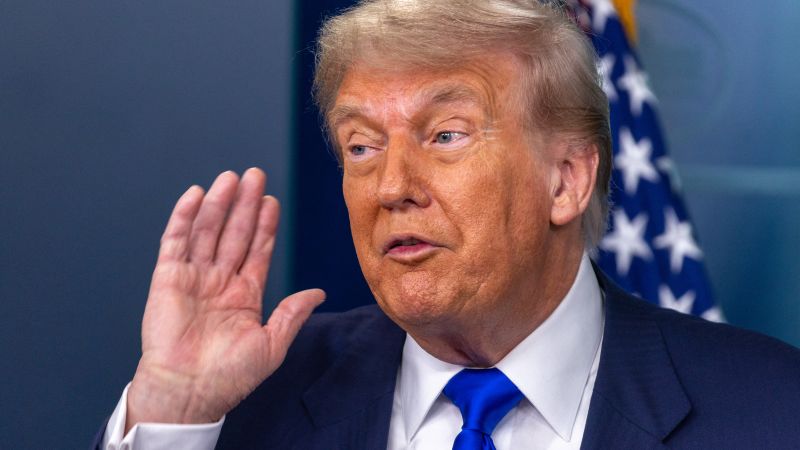US President Donald Trump has cast doubt on the possibility of reaching a trade deal with Japan, following his recent threats of imposing higher tariffs on Japanese exports to the United States. Speaking to reporters aboard Air Force One on Tuesday, Trump expressed skepticism, stating, “I’m not sure if we’re gonna make a deal, I doubt it, with Japan.” His comments come just days before the July 9 deadline for the end of a 90-day pause on his “reciprocal tariffs.”
The announcement comes as US trade partners, including Japan, are eager to negotiate agreements that could appease the American president. Japanese exports to the US were subjected to a 24% levy when Trump initiated his global tariff strategy on April 2, which was temporarily paused for three months. The timing of Trump’s remarks coincides with Japanese Foreign Minister Takeshi Iwaya’s visit to Washington for a Quad meeting, alongside counterparts from Australia and India, and follows Japan’s tariff negotiator Ryosei Akazawa’s seventh trip to the US capital for trade discussions.
Background and Context
Japan remains a crucial trade partner and security ally of the United States in East Asia, although relations have been strained by Trump’s aggressive tariff policies. On Tuesday, Trump further stated that he does not intend to extend the tariff pause beyond July 9, asserting, “I’m not thinking about a pause.” He added, “Some countries, we won’t even allow to trade. But for the most part, we’re gonna determine a number,” indicating a potential increase in tariff rates.
On social media, Trump accused Japan of not purchasing American rice, a claim that contradicts data from the US Census Bureau. Last year, Japan imported $298 million worth of rice from the US, and between January and April this year, the figure stood at $114 million. Despite these figures, Trump reiterated his claim, stating, “They need rice so badly, but they won’t take rice.” He also alleged that Japan does not buy US cars, saying, “We didn’t give them one car in 10 years,” despite the Japan Automobile Importers Association reporting that Japan imported 16,707 American automobiles last year.
Implications of Tariff Negotiations
The move represents a continuation of the trade impasse between Japan and the US, primarily over tariffs on cars, a vital sector of the Japanese economy. Japan has sought a reduction in the 25% tariff imposed on automobiles, but Trump has remained firm. In mid-June, Japanese Prime Minister Shigeru Ishiba met with Trump at the G7 summit, where they agreed to advance trade talks, though no significant breakthrough was achieved.
According to Japan’s Deputy Chief Cabinet Secretary Kazuhiko Aoki, trade discussions between the two nations are ongoing. He acknowledged Trump’s claims but refrained from commenting directly, stating, “Japan will continue to engage vigorously in sincere and honest discussions toward the realization of an agreement that will benefit both Japan and the United States.”
Expert Opinions and Historical Comparisons
Experts suggest that the current trade tensions echo past US-Japan economic disputes, such as those in the 1980s over automobiles and electronics. According to trade analyst Dr. Emily Chen, “The US-Japan trade relationship has always been complex, with periods of friction followed by negotiation and compromise. The current situation is a continuation of this historical pattern.”
Meanwhile, economic analysts warn that prolonged tariff disputes could have broader implications for global trade dynamics. Dr. Robert Lee, an international trade expert, notes, “If the US continues to escalate tariffs, not only with Japan but with other key partners, it could lead to a fragmentation of global trade alliances and impact economic growth worldwide.”
Looking Ahead
The future of US-Japan trade relations remains uncertain as the July 9 deadline approaches. The outcome of these negotiations will likely have significant implications for both economies. As both sides continue discussions, the international community watches closely, aware that the resolution of this trade dispute could set a precedent for future economic diplomacy.
As the situation develops, stakeholders on both sides hope for a mutually beneficial agreement that can strengthen economic ties and promote stability in the region. The coming weeks will be crucial in determining the trajectory of US-Japan trade relations and their impact on the global economic landscape.
 Iran Halts Cooperation with UN Nuclear Watchdog Amid Rising Tensions
Iran Halts Cooperation with UN Nuclear Watchdog Amid Rising Tensions Hamas Open to Ceasefire with Israel Amid Demands for War’s End in Gaza
Hamas Open to Ceasefire with Israel Amid Demands for War’s End in Gaza Inside Trump’s Unconventional West Wing: A Hub of Activity and Influence
Inside Trump’s Unconventional West Wing: A Hub of Activity and Influence Bryan Kohberger’s Expected Plea Deal in Idaho Student Killings Raises Unanswered Questions
Bryan Kohberger’s Expected Plea Deal in Idaho Student Killings Raises Unanswered Questions Iran Halts Cooperation with IAEA Amid Nuclear Facility Security Concerns
Iran Halts Cooperation with IAEA Amid Nuclear Facility Security Concerns